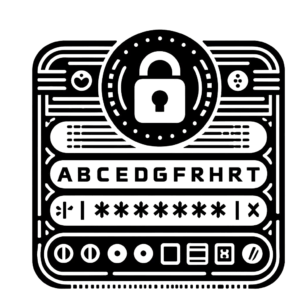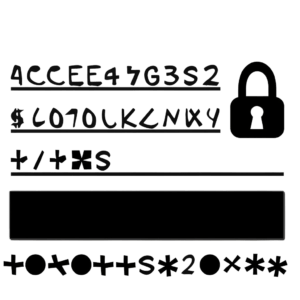Why Strong Passwords Are Crucial

In today’s world of technology, it’s really important to have strong passwords to protect yourself from cyber threats. Having weak passwords can put your personal information at risk and make you vulnerable to attacks from hackers. These hackers have tricks up their sleeves, like guessing passwords over and over until they get in or using a list of common passwords to try and break into accounts. This can lead to your private information being exposed and potentially losing a lot of money.
It’s important to have strong passwords to keep your personal and work accounts safe from people trying to access them without permission. A strong password should be 12 characters long or more, and have a mix of capital and lowercase letters, numbers, and special characters. Don’t use things like birthdays, names, or common words in your passwords, as these can be figured out easily by hackers.
Following good practices for password security, like using a different password for each account, turning on two-factor authentication, and changing your passwords often, can make a big difference in keeping your online accounts safe. Your password is like a shield that protects you from online dangers, so it’s important to take the time to make sure it’s strong and unique to keep your valuable information safe.
Common Mistakes in Password Creation
When it comes to creating strong passwords, many people make common mistakes that make their online accounts vulnerable to cyber attacks. One big mistake is using simple and easy-to-guess passwords like “123456” or “password”. Hackers often try these passwords first when attempting to break into an account. Another mistake is using personal information like birthdays, family member names, or favorite sports teams. While these details might be easy to remember, they can also be easily found on social media or other online sources. Another risky behavior is reusing passwords for multiple accounts. If one account is hacked, hackers can easily access other accounts that use the same password.
Make sure you don’t make the usual mistakes by setting up different and tricky-to-guess passwords for each account. A good password should be at least 12 jumbled up characters long and use a mix of uppercase and lowercase letters, numbers and symbols. Think about using random combinations of words or phrases that only you would know. Also, change your passwords regularly and use a safe password manager to help stop people from getting into your accounts. By doing these things, you can boost the safety of your online accounts and keep your private information away from online dangers.
What Makes a Password Strong
The Role of Complexity and Length
When it comes to creating strong passwords, the role of complexity and length cannot be overstated. Strong passwords are essential in safeguarding your sensitive information from cyber threats. To ensure the highest level of security, it is crucial to create passwords that are both complex and lengthy.
It’s important to use strong passwords that include a mix of capital and lowercase letters, numbers, and special symbols. When you use a variety of characters in your password, it makes it much harder for hackers to guess or crack it using automated methods.
In addition, the longer your password is, the stronger it is. A longer password gives more options for possible combinations, which makes it much harder for hackers to figure out. It’s best to aim for a password that is at least 12 characters long to keep your information safe and secure.
Creating strong and unique passwords with lots of characters can help keep your online accounts safe and prevent hackers from stealing your personal information.
The Impact of Unpredictability
When it comes to making strong passwords, one important thing to remember is to make them unpredictable. If your password is easy to guess, it’s easier for hackers to access your personal information. By making your passwords unpredictable, you can better protect your accounts and keep your data safe from cyber attacks.
Wondering how to make your passwords super secure? One easy way is to mix things up – think a mix of capital letters, lowercase letters, numbers, and symbols. Stay away from obvious info like your birthday or your pet’s name. Instead, try creating passwords from random phrases or a bunch of unrelated words. This will make it harder for cyber thieves to crack your password and keep your accounts safe.
It is crucial to use unique passwords for each of your accounts. This way, if one account is hacked, your other accounts will remain secure. To help manage and remember all of your strong passwords in a safe and convenient way, consider using a password manager.
In summary, it’s important to get creative with your passwords to keep your online accounts and personal info safe from cyber attacks. By using these tips, you can make sure your passwords are strong and hard for hackers to figure out.
Methods of Creating Strong Passwords
Password Generators
Keeping your information safe online is very important. One way to do this is by creating strong and unique passwords. Password generators are helpful tools that can create complex and secure passwords that are hard for hackers to figure out. They work by mixing up letters, numbers, and special symbols to make passwords that are almost impossible to guess.
One essential trick for creating secure passwords is to use a mix of big and small letters, numbers, and unique symbols. Avoid using easy-to-guess details such as your name, date of birth, or common words. For better security, each of your online accounts should have a different password. This way, if one password gets discovered, it won’t put all your accounts at risk.
By using password generators and following good password habits, you can better protect your personal and sensitive information online. A strong password is like a shield against cyber attacks, so be sure to create and change your passwords often to stay safe.
Creative Manual Techniques
Creating strong passwords is important for keeping your online accounts safe. One way to do this is by using a passphrase, which is made up of multiple words. For example, you could use unrelated words or a favorite quote to make a unique password that is hard for hackers to figure out but easy for you to remember.
Another manual technique is to incorporate special characters, numbers, and capital letters into your password. By mixing these elements throughout the password, you can boost its complexity and strengthen its resistance to brute force attacks. Additionally, consider substituting certain letters with similar-looking symbols or numbers to further increase the password’s strength.
Remember, the key to creating strong passwords is to avoid using easily guessable information such as birthdays, pet names, or common phrases. By utilizing these creative manual techniques, you can better protect your accounts and safeguard your sensitive data from cyber threats.
Best Practices for Password Management
Use of Password Managers
When it comes to creating secure passwords, one of the most helpful tools you can use is a password manager. Password managers are programs that help you safely store and organize your passwords for all your online accounts. They allow you to generate unique and complex passwords for each account, which makes it more difficult for hackers to guess. Not only do password managers enhance the security of your accounts, but they also make it simpler for you to access them by automatically inputting your login information.
Furthermore, password managers have helpful tools like assessing how strong your passwords are and reminding you when it’s time to change them. This can help you keep up with good security practices. Remembering all the different passwords for our many online accounts is getting harder, and it’s not safe to rely on memory alone. By using a password manager, you can better protect your personal and sensitive information online.
Two-Factor Authentication
Two-factor authentication (2FA) is an important extra security step to keep your accounts safe. Instead of just using a password, 2FA makes you provide two different ways to prove it’s really you before you can log in. For example, you might have to enter a special code sent to your phone in addition to your usual password. This helps make sure that even if someone gets your password, they still can’t get into your account without that extra code.
When you’re making passwords, using 2FA can help protect your private information from online dangers. This extra security feature adds another level of protection on top of your password, making it harder for hackers to break in. Remember, a strong password is important, but adding 2FA can make your accounts even safer in today’s online world.
Stay ahead of cybercriminals by following best practices in password security and utilizing two-factor authentication wherever possible. Protect your online accounts and keep your information secure with these proactive measures.
Recap of Key Points
It’s important to use strong passwords to protect your personal and sensitive information online. To make a secure password, mix uppercase and lowercase letters, numbers, and special characters. Don’t use easy-to-guess information like birthdays or pet names, since they can make your passwords easier for hackers to crack.
Also, refrain from using the same password for everything. This prevents a threat to your security if one account gets hacked. It’s smart to use a tool known as a ‘password manager’, which helps you make and keep track of strong, unique passwords for each of your accounts.
It is important to update your passwords often and turn on two-factor authentication to make your accounts more secure. A strong password is like a shield that helps protect your information online, so take the time to make sure your passwords are strong and well-managed.
By using these helpful tips for making strong passwords, you can greatly improve your online security and reduce the chances of someone getting into your private information without permission.
Looking Towards the Future of Password Security
In today’s connected world, online threats are getting more sophisticated. It is really important to have powerful passwords to shield your personal details. Sneaky tech-criminals are continuously inventing new methods to snatch private information, so it’s vital that we all ensure our passwords are robust. One way to do this is by mixing up letters, symbols, and numbers in your password. Try to stay away from easy-to-guess passwords like “123456” or “password” as these are a piece of cake for these criminals to figure out. It’s essential that we all play our part to keep our online accounts secure.
Furthermore, utilizing a password manager can streamline the process of generating and storing complex passwords securely. Password managers not only help in creating strong passwords but also facilitate password management by storing them in an encrypted vault. Implementing two-factor authentication (2FA) adds an extra layer of security to your accounts, requiring a secondary verification step in addition to your password.
With the way technology is improving, the way we keep our accounts safe might involve using things like fingerprints or facial recognition instead of just passwords. These new methods are more convenient and secure, making it easier to log in without worrying about remembering a complex password. By staying up to date on new security methods and using stronger security measures, both people and businesses can keep their information safe from online criminals.
